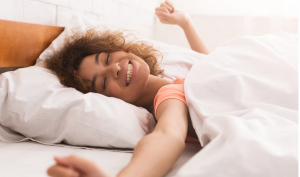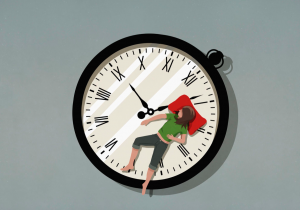Proven Personal Habits for Better Sleep
 A good night’s sleep is just as important as regular exercise and a healthy diet.
A good night’s sleep is just as important as regular exercise and a healthy diet.
Research shows that poor sleep has immediate negative effects on your hormones, exercise performance, and brain function (To Learn More).It can also cause weight gain and increase disease risk in both adults and children. In contrast, good sleep can help you eat less, exercise better, and be healthier. Over the past few decades, both sleep quality and quantity has declined. In fact, many people regularly get poor sleep. If you want to optimize your health or lose weight, getting a good night’s sleep is one of the most important things you can do.
Here are some evidence-based tips to help you sleep better at night:
Reduce blue light exposure in the evening
Exposure to light during the day is beneficial, but nighttime light exposure has the opposite effect. Again, this is due to its effect on your circadian rhythm, tricking your brain into thinking it’s still daytime. This reduces hormones like melatonin, which help you relax and get deep sleep.
Blue light — which electronic devices like smartphones and computers emit in large amounts — is the worst in this regard.
There are several popular methods you can use to reduce nighttime blue light exposure. These include:
- Wear glasses that block blue light.
- Download an apps or buy screen protectors to block blue light on your laptop, computer, and phone. (Be sure to do this if you spend most of your day on a screen!)
- Install an app that blocks blue light on your smartphone. These are available for both iPhones and Android models.
- Stop watching TV and turn off any bright lights 2 hours before heading to bed.
Your body’s circadian rhythm functions on a set loop, aligning itself with sunrise and sunset.
Being consistent with your sleep and waking times can aid long-term sleep quality. One study noted that participants who had irregular sleeping patterns and went to bed late on the weekends reported poor sleep.
Other studies have highlighted that irregular sleep patterns can alter your circadian rhythm and levels of melatonin, which signal your brain to sleep.
If you struggle with sleep, try to get in the habit of waking up and going to bed at similar times. After several weeks, you may not even need an alarm.
Try to get into a regular sleep/wake cycle — especially on the weekends. If possible, try to wake up naturally at a similar time every day.
Several supplements can induce relaxation and help you sleep, including:
- Ginkgo biloba: A natural herb with many benefits, it may aid sleep, relaxation, and stress reduction, but the evidence is limited. Take 250 mg 30–60 minutes before bed.
- Glycine: A few studies show that taking 3 grams of the amino acid glycine can improve sleep quality.
- Valerian root: Several studies suggest that valerian can help you fall asleep and improve sleep quality. Take 500 mg before bed.
- Magnesium: Responsible for over 600 reactions within your body, magnesium can improve relaxation and enhance sleep quality.
- L-theanine: An amino acid, L-theanine can improve relaxation and sleep. Take 100–200 mg before bed.
- Lavender: A powerful herb with many health benefits, lavender can induce a calming and sedentary effect to improve sleep. Take 80–160 mg containing 25–46% linalool.
Make sure to only try these supplements one at a time. While they’re not a magic bullet for sleep issues, they can be useful when combined with other natural sleeping strategies. Several supplements, including lavender and magnesium, can help with relaxation and sleep quality when combined with other strategies.
Many people believe that the bedroom environment and its setup are key factors in getting a good night’s sleep.
These factors include temperature, noise, external lights, and furniture arrangement.
Numerous studies point out that external noise, often from traffic, can cause poor sleep and long-term health issues.
In one study on the bedroom environment of women, around 50% of participants noticed improved sleep quality when noise and light diminished.
To optimize your bedroom environment, try to minimize external noise, light, and artificial lights from devices like alarm clocks. Make sure your bedroom is a quiet, relaxing, clean, and enjoyable place.
A relaxing bath or shower is another popular way to sleep better.
Studies indicate that they can help improve overall sleep quality and help people — especially older adults — fall asleep faster. In one study, taking a hot bath 90 minutes before bed improved sleep quality and helped people get more deep sleep. Alternatively, if you don’t want to take a full bath at night, simply bathing your feet in hot water can help you relax and improve sleep.
Exercise is one of the best science-backed ways to improve your sleep and health. It can enhance all aspects of sleep and has been used to reduce symptoms of insomnia. One study in older adults determined that exercise nearly halved the amount of time it took to fall asleep and provided 41 more minutes of sleep at night.
In people with severe insomnia, exercise offered more benefits than most drugs. Exercise reduced time to fall asleep by 55%, total night wakefulness by 30%, and anxiety by 15% while increasing total sleep time by 18%.
Although daily exercise is key for a good night’s sleep, performing it too late in the day may cause sleep problems.
This is due to the stimulatory effect of exercise, which increases alertness and hormones like epinephrine and adrenaline.
However, some studies show no negative effects, so it clearly depends on the individual
Adapted from healthline.com and attached sources
Join Our Community
Archives
- January 2023
- December 2022
- September 2022
- August 2022
- June 2022
- May 2022
- April 2022
- March 2022
- February 2022
- January 2022
- December 2021
- November 2021
- October 2021
- September 2021
- August 2021
- July 2021
- June 2021
- May 2021
- March 2021
- September 2020
- August 2020
- July 2020
- June 2020
- May 2020
- April 2020
- March 2020
- February 2020
Subscribe

Sign up to receive FREE toolkit
From Dr. Hyman, #1 NY Times & Amazon Author
We never spam or sell your e-mail









Follow Our Every Move